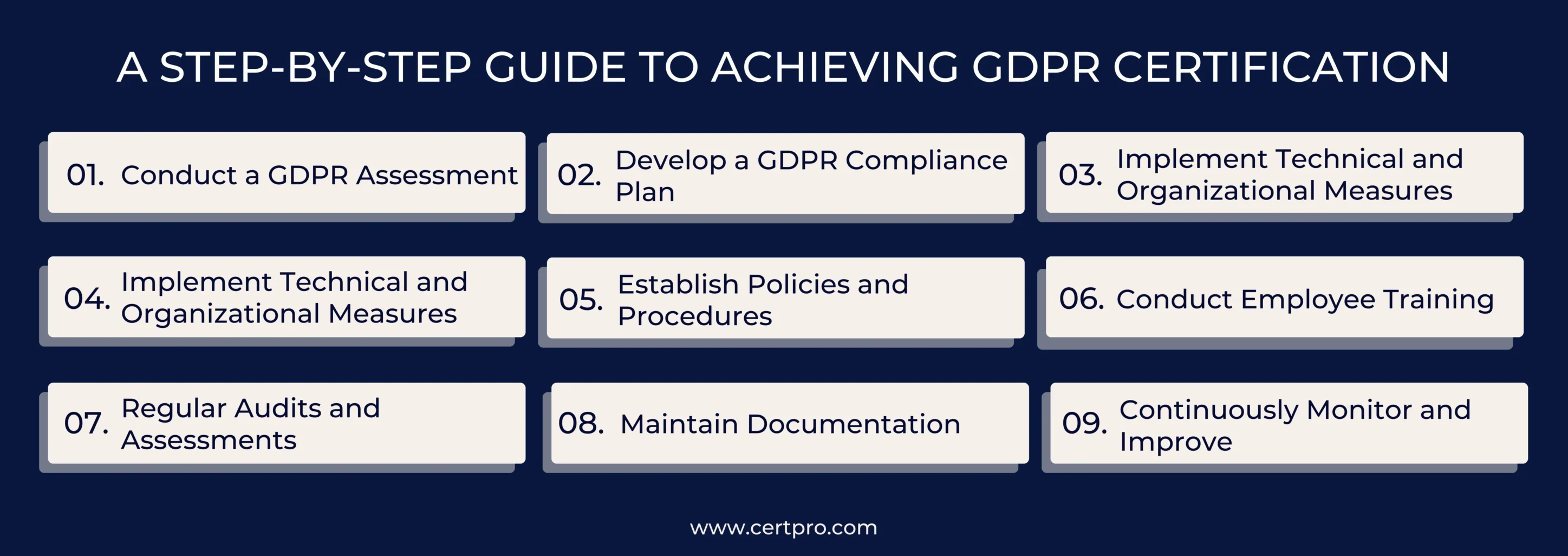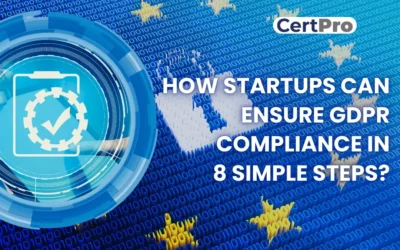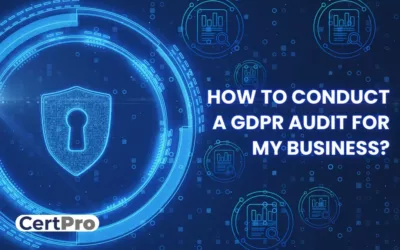GDPR
GENERAL DATA PROTECTION REGULATION
The EU’s General Data Protection Regulation (GDPR), effective May 25, 2018. It aims to protect individuals’ privacy and personal data globally. Companies handling the personal data of EU citizens are required to abide by GDPR laws. These include getting permission before processing data, establishing explicit privacy policies, and implementing strong security measures. Failure to comply may have dire consequences. GDPR certification requires the appointment of a designated Data Protection Officer (DPO). Knowledge of GDPR principles is essential in handling and updating data frequently. In summary, GDPR encourages compliance with strict global data protection regulations. It supports proactive handling of personal information to foster confidence and avert fines.

GDPR Certification and Auditing Services by CertPro
CertPro is a well-known certification and auditing organization focusing on data security and privacy. It provides each firm’s GDPR certification services and customized GDPR compliance solutions. Using its data handling skills, CertPro provides specialized support, extensive audits, and increased data protection to assure regulatory compliance and client trust.
Why Choose CertPro for GDPR Certification and Auditing?
CertPro is the best solution for GDPR certification since it provides compelling explanations. Furthermore, our professionals are fully aware of the global data protection requirements. We offer solutions that are suited to your company’s requirements through rigorous assessments. Therefore, we offer focused guidance and speedy repair procedures. CertPro provides GDPR compliance certification, improved data protection, client confidence, and operational excellence based on a proven track record. Choose CertPro immediately for the following reasons:
| Factors | CertPro Advantage |
|---|---|
| Time to Certification | 4x faster than traditional approaches |
| Price | Competitive rates with flexible options |
| Process | Streamlined and efficient methodology |
| Expertise | 10+ years of industry experience |
CertPro’s Cost-Effective Approach to GDPR Certification
CertPro’s complete approach paves the path for GDPR certification. As a result, our personnel are aware of the financial challenges that businesses must confront. Although we streamline resource allocation and speed up the certification process, we do not lessen compliance requirements. We reduce expenses by focusing on core issues and offering tailored solutions. CertPro helps businesses acquire GDPR certification, assuring data protection compliance while maximizing their budget. As a result, choose CertPro as a GDPR consultant for a practical and cost-effective approach to compliance.
| No. of employees | Timeline | Cost (approx.) |
| 1 – 25 | 4 weeks | 2500 USD |
| 25-100 | 6 weeks | 3500 USD |
| 100-250 | 6-8 weeks | 5000 USD |
| 250 plus | 8 weeks | Custom plans |
Understanding the GDPR Certification: Purpose, Scope, and Key Principles
Getting GDPR certified is an optional approach for organizations. However, organizations with GDPR certification can showcase their commitment to data security, which helps them create confidence with customers. Moreover, it reduces legal risks, improves data management, and enhances their global brand. As data privacy concerns develop, GDPR certification gives businesses an advantage and ensures that people’s data is managed properly and lawfully.
Purpose and Scope of GDPR
The General Data Protection Regulation (GDPR) aims to enhance customer control over data. Standardizing data protection regulations is another goal. Privacy and openness are two of the goals of GDPR. It guarantees that enterprises manage data responsibly. Every company using EU citizens’ data can get certified under the GDPR. Controllers and processors of data are included in this. A variety of personal data types are protected under GDPR. They consist of IDs obtained online, names, contact information, financial data, and health records. It affects companies managing the personal data of EU citizens as well as nonprofits, governmental organizations, and service providers.
The Key principle of GDPR
The GDPR is based on five basic principles. These principles will govern how personal data should be handled:
Lawfulness, Fairness, and Transparency: Organizations need a valid legal reason to handle personal data. This may include the individual’s consent, legal obligations, legitimate interests, or public interest. Organizations must also be transparent. They need to show how they use and process personal data. This ensures it’s done fairly and with respect for individual rights.
Purpose Limitation: Personal data should only be used for specific reasons. Organizations must be clear about why they collect data. Moreover, it cannot be used for unrelated or undisclosed purposes.
Data Minimization: Only the personal information required for the indicated purposes should be gathered and handled. Organizations should refrain from gathering excessive or useless data.
Accuracy: Personal information must be correct and up-to-date. Organizations should take measures to update or delete erroneous data. In addition, data must be maintained in a form that allows identification for as long as necessary.
Storage Limitation: Data should only be maintained for as long as necessary. Organizations should establish proper retention durations but erase or anonymize data when no longer required.
Integrity and Confidentiality: Organizations must be put in the correct place. Only then can security measures protect personal information against unauthorized access, loss, destruction, or harm.
Accountability: Organizations must comply with GDPR. This includes implementing the essential safeguards and tracking processing activities. In addition, data protection impact assessments must be conducted, and a Data Protection Officer (DPO) must be designated when needed.
These principles aim to ensure the safety of personal data and the processing of it reasonably, transparently, and securely while respecting individuals’ rights.
A Step-by-Step Guide to Achieving GDPR Certification
To achieve GDPR certification, organizations must complete the following steps:
Conduct a GDPR Assessment: Begin by extensively analyzing your organization’s data processing activities, privacy policies, and existing restrictions. Identify any gaps and modify them.
Develop a GDPR Compliance Plan: Using the assessment, establish a detailed plan outlining the actions and procedures required for compliance. Include timelines, responsibilities, and resources to guarantee a successful finish.
Implement Technical and Organizational Measures: Establish adequate safeguards to protect personal information, including encryption, access limits, and data anonymization. Additionally, conduct ongoing vulnerability assessments.
Implement Technical and Organizational Measures: Establish adequate safeguards for data, including encryption, access limits, and data anonymization. Additionally, conduct ongoing vulnerability assessments.
Establish Policies and Procedures: Create and implement clear policies and procedures. Consider issues such as data subjects’ rights and data breach response. Additionally, there is data retention, consent management, and vendor management.
Conduct Employee Training: Inform employees who handle personal data on GDPR principles, data protection best practices, and their duties. Provide regular training updates to keep them up to date on any changes.
Regular Audits and Assessments: Conduct frequent internal audits and assessments. This helps examine your data protection practices and identify areas for non-compliance. Consider external audits to get a fair assessment of your GDPR compliance.
Maintain Documentation: Keep detailed documents of your GDPR compliance efforts. This includes data processing activities, policies, processes, training records, and audit results. This documentation demonstrates your dedication to compliance and provides evidence of your efforts.
Continuously Monitor and Improve: Stay updated on changes in data protection rules, and constantly examine and update your processes. Aim for continuous improvement in your data protection practices.
Following these steps allows firms to showcase their commitment to GDPR compliance certification. This helps to enhance consumer and stakeholder trust in handling personal data.

Importance of GDPR compliance
GDPR compliance is vital in the digital environment. These are some reasons why GDPR is so necessary:
- Data Protection Standard: GDPR implemented a substantial data protection and privacy standard.
- Competitive Advantage: GDPR-compliant organizations will always have more opportunities to expand in this competitive industry.
- Customer Trust and Reputation: GDPR certification provides a pathway to enhance customer trust and the firm’s reputation.
- Legal Compliance and Penalties: Organizations may face hefty fines if they fail to meet GDPR compliance.
- International Data Transfers: Meeting GDPR requirements facilitates global data exchanges.
- Data Security and Risk Mitigation: GDPR-compliant organizations promote strong security measures that reduce the risk of data breaches.
- Global Reach: The GDPR applies to organizations worldwide that handle EU residents’ data.
- Harmonization of Data Protection Laws: The GDPR defines data protection regulations across the EU. It makes compliance more accessible for businesses in various member states.
GDPR compliance certification is essential for legal compliance. It protects individual rights by fostering trust, reducing risks, and maintaining a competitive advantage. It ensures efficient data management and protects privacy.
The Requirements for GDPR Certification
To obtain GDPR certification, a business must meet specific requirements. The GDPR certification requirements may differ depending on the certifying authority and scheme utilized. However, standard features and requirements typically include:
GDPR Compliance: GDPR compliance demands that you demonstrate compliance with GDPR principles. It includes transparent data management, utilizing data solely for specific purposes, ensuring data accuracy, and accountability.
Documentation and Policy: Organizations seeking GDPR certification must have a detailed data protection policy that outlines how they collect, use, and manage personal data. This policy should include privacy notices. People must be informed about this policy; thus, basic, easy-to-read privacy declarations must be promoted.
Data Protection Officer (DPO): The GDPR compels firms with EU citizens to have a DPO. As a result, they monitor compliance, offer advice, and increase awareness. Although formal qualifications are not required, knowing GDPR, data privacy, communication, and independence is critical. Furthermore, a DPO must reduce risks, promote confidence, and improve data management while maintaining privacy.
Data Privacy Impact Assessment (DPIA): Data breaches are rising. Firms must do DPIAs regularly. Thus, you may detect flaws while being GDPR-compliant.
Security Measures: Adequate security measures are needed. Only an organization can avoid the loss of personal data. Firms seeking GDPR certification should have technological and organizational safeguards to prevent data loss and unauthorized access.
Data Subject Rights: Customers have several rights as data subjects. They can now inquire about the data collected and how it is used. Customers also have the right to edit or delete their data.
Data Breach Notification: Companies seeking GDPR certification must immediately notify the appropriate authorities and impacted individuals if a data breach occurs. As a result, companies must create a robust data breach response policy.
Training and Awareness: All employees should get data protection training to better understand their jobs and best practices.
This is a comprehensive summary of the present technology scene. For a more detailed explanation, please visit CertPro.com and contact us.

Benefits of GDPR Certification
GDPR certification offers several benefits for organizations. Some of the main benefits are discussed below:
Increased Trust and Credibility: GDPR compliance provides a pathway to demonstrating that you follow GDPR principles. This proves that the organization’s transparent data management, utilizing data solely for specific purposes, ensures data accuracy and accountability.
Competitive Advantage: Businesses with GDPR certification have several advantages. First, they show a dedication to data security, which increases client confidence and makes customers feel more comfortable exchanging information.
Reduced Risk of Fines and Penalties: The risk of fines is decreased by GDPR compliance. It also lessens the possibility of penalties. Businesses thus deal with fewer noncompliance problems.
Improved Data Protection Procedures: GDPR compliance fortifies data security procedures and guards against data breaches. Strong security measures are part of this, which also entails strict policies and processes.
Moreover, GDPR certification benefits businesses. It matters in today’s data-driven world and enhances their standing. Businesses are viewed as accountable data managers.

Eligibility for GDPR Certification
Any organization that handles data on EU persons is eligible to become GDPR-certified. There is no difference in size or position. This covers businesses, nonprofits, service providers, and governmental entities. This certification demonstrates a dedication to data security, increasing stakeholders’ confidence and setting the company apart as a trustworthy data processor.
GDPR Compliance: Who Should Ensure Compliance?
Any firm managing data in the EU must comply with GDPR. Furthermore, this is true for every organization. It matters, no matter how big or where—for example, companies, nonprofit organizations, and governmental bodies. Service suppliers are also encompassed. Processors and data controllers must adhere to guidelines. They safeguard rights and privacy in this way. They also handle problems and identify risks. This compliance increases customers’ confidence. Additionally, it fosters confidence among stakeholders and partners.
Understanding the GDPR Fines
There are some financial penalties for non-compliance, which are classified into two tiers:
Tier 1: This tier covers less severe violations. The maximum fine is €10 million. Otherwise, 2% of the organization’s global annual turnover, whichever is higher. Infractions in this tier include failing to establish safety procedures, conduct impact assessments, or retain records.
Tier 2: This tier is for severe violations. Fines can reach up to €20 million, but they can also be 4% of global annual turnover. This category includes several violations, such as incorrect consent procedures and unlawful data processing. Noncompliance with data subjects’ rights is also included, as is failure to notify authorities of data breaches.
The Costs of GDPR Certification
GDPR certification fees depend on several criteria, including your business’s size and complexity. In the case of small companies, certification costs are lower compared to large-scale industries. GDPR compliance involves various costs. It includes initial evaluations, process adjustments, and administrative fees. In addition, employee training and hiring a Data Protection Officer (DPO) are also necessary. While hiring GDPR consultants can be more expensive. They provide significant value by accelerating the compliance process. It ensures adherence to regulations and reduces risks.
GDPR compliance involves various costs. It includes initial evaluations, process adjustments, and administrative fees. In addition, employee training and hiring a Data Protection Officer (DPO) are also necessary. While hiring GDPR consultants can be more expensive. They provide significant value by accelerating the compliance process. It ensures adherence to regulations and reduces risks.
GDPR compliance focuses on data security, brand growth, and regulatory adherence. Consult with data protection and compliance professionals to estimate your firm’s GDPR compliance expenses accurately.
A Complete Guide to GDPR Compliance
GDPR compliance entails adhering to the General Data Protection Regulation’s guidelines for protecting people’s data. To achieve this, the organization must do a data inventory. This allows enterprises to understand the data they collect and handle. Then, privacy by design and default should be used to ensure data protections are in place. Then, data protection policies and procedures will be created to govern how data is processed. Finally, staff must be trained on GDPR principles and their respective tasks. Additionally, conduct frequent audits to ensure compliance and identify areas for improvement. These strategies help companies develop a solid data protection foundation while meeting GDPR requirements.
The Validity Period of GDPR Certification
A GDPR certification is valid for no set period. When an organization receives GDPR certification, it demonstrates that it meets the current compliance standards. In contrast, GDPR compliance is a continuous activity. Firms must stay updated. Organizations must regularly update their policies and practices, conduct audits, and respond to legislative changes to secure personal data and comply with GDPR principles.
Understanding the Impact of GDPR on India: Assessing the Pros and Cons
The General Data Protection Regulation (GDPR) made a vital impact in India. It has raised public awareness of the importance and necessity of data security and privacy. It also paves the way for enhancing the data-handling practices of leading Indian organizations. Moreover, it also made Indian citizens trust that their personal information was safe in this digital world. However, small and medium-scale organizations faced some difficulties due to the price and complexity of the GDPR. GDPR also plays a provisional role in Indian organizations dealing with EU citizens’ data. India must balance the benefits of improved data protection and privacy with the problems that businesses confront while ensuring that its data protection laws are adequate.
CertPro: Your Trusted Partner in Achieving GDPR Certification
CertPro has years of experience and a deep knowledge of how complicated GDPR is. We offer a thorough GDPR compliance certification roadmap that fits the needs of each business. Our skilled professionals carefully look at how to handle data to find holes or risks that need to be fixed.
Therefore, CertPro wants to help your company develop an attitude of data safety beyond following the law. We give you strategic advice, make the necessary changes, and monitor your actions to ensure you stay GDPR compliant. CertPro’s dedication to being affordable will help you in the future. Thus, we assist you in developing solutions that make compliance efficient within budget. If a business hires CertPro as its GDPR consultant, you enable data security, client trust, and strict compliance with the rules. Our GDPR compliance experts will help ensure your business follows the laws and standards. This will set you up for success in a world driven by data.
FAQ’s
What are the rights of individuals under GDPR?
Under GDPR, individuals have the following rights: the right to access their data; the right to rectify inaccurate data; the right to erasure (“right to be forgotten”); the right to restrict processing; the right to data portability; the right to object to processing; and rights related to automated decision-making and profiling.
Do small businesses need to comply with GDPR?
Yes, small businesses need to comply with GDPR if they process the personal data of individuals in the European Union (EU) or offer goods or services to EU residents. The GDPR applies to organizations of all sizes that handle EU citizens’ data, irrespective of their geographical location.
How long does it take to comply with the GDPR?
The time it takes to become GDPR-compliant varies depending on the size and complexity of the organization, existing data protection practices, and resources allocated to compliance efforts. It can range from several months to over a year, considering the implementation of necessary policies, procedures, and technical measures.
How can I determine if my organization is GDPR-compliant?
To determine if your organization is GDPR-compliant, you should conduct a comprehensive assessment of your data processing activities, policies, and procedures. That involves reviewing data protection practices, assessing data flows, documenting data processing activities, ensuring a legal basis for processing, and conducting regular internal audits to identify compliance gaps.
Can organizations transfer personal data to countries outside the EU under GDPR?
Yes, organizations can transfer personal data to countries outside the European Union (EU) under GDPR, but they must ensure an adequate level of protection for the data. This can be achieved through various mechanisms, such as obtaining explicit consent, implementing Standard Contractual Clauses (SCCs), relying on Binding Corporate Rules (BCRs), or relying on approved certification mechanisms or codes of conduct.
HOW STARTUPS CAN ENSURE GDPR COMPLIANCE IN 8 SIMPLE STEPS?
General Data Protection Regulation is a highly influential data privacy regulation worldwide. It has extraterritorial implications for businesses worldwide that process the personal data of EU residents. Startups are enthusiastic about scaling while maintaining trust...
AI and GDPR: How Artificial Intelligence Can Ensure Data Protection?
The European Union’s General Data Protection Regulation offers a legal data protection and privacy framework. As Artificial Intelligence continues to expand across industries in modern technology, the concept of AI and GDPR becomes relevant. In 1950, researchers...
HOW TO CONDUCT A GDPR AUDIT FOR MY BUSINESS?
The General Data Protection Regulation (GDPR) is vital for today's digital landscape. It is a cornerstone for safeguarding people's privacy rights in the European Union (EU). Therefore, organizations dealing with EU residents' data must follow these GDPR rules....



